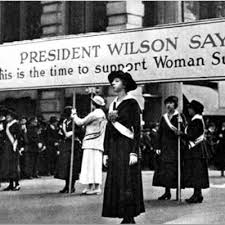
|
20A002 Votes for Women? by Jim Davies, 1/14/2020
Look back 100 years, and in the Western world there was a deal of fuss about allowing ladies to vote. Somehow, when women were allowed to choose who was to rule them, it was seen as a big triumph, something to celebrate.
Did those results follow from enfranchising ladies? - of course. You vote, you make yourself responsible for what your elected representatives do. Eleven million Germans voted for the NSDAP, and presumably half of them were female; Hitler made himself very attractive to young ladies. But responsibility comes with privilege. Yet even today, female scholars wax eloquent about the scandal that half the adult population was kept out of the voting booth prior to 1920. Why? - why have they not begun by analysing first whether the act of voting is moral for either gender? There were, before the suffrage was doubled, some laws that discriminated against women. They often varied by State. Some forbade ladies to work in eateries by night, allowing only daytime hours. Perhaps the lawmakers feared for their safety on ill-lit streets in the darkness. Some States forbade them to practice as lawyers; no doubt male lawyers didn't want the competition. Some limited working hours for women, preventing them earning as much as men; perhaps they were thought to be less physically strong (but wait, isn't that usually true?) And in 1932 the National Recovery Act forbade females to work for government. Far be it from me to commend any law at all, but that one saves ladies the mental labor of working out that all government work is dishonest. In 1981 SCOTUS ruled that girls cannot be drafted (what's to complain about that?) and as recently as 2014, it allowed employers to provide health insurance coverage that excluded birth-control pills. Whoa, hang on; employers graciously provide the employee benefit of insurance, and they have to get Nanny's permit regarding the extent of the coverage? This is madness on steroids. More to the point, all these examples are quite trivial and, while some (the labor laws for example) might well be a serious obstacle to women struggling to make ends meet, they are well-intended, meant to protect the gentler sex rather than to restrict it. And far more to the point yet, they are all government laws. Even if they are all as bad as some feminists maintain, government is the culprit. Not men, qua men. Eliminate government (please!) and the discrimination disappears. I'm a fan of early-Victorian English fiction, and 200 years ago it's true that in that country there were laws that definitely hurt women. They were excluded from a wide range of job opportunities, and not allowed to inherit property even if a benefactor wished it. But those injustices were removed long before women were given the vote and, again, would not have arisen but for government. These novels were often written by ladies, such as Austen and Brontë, who did nicely from royalties, as did Alcott here; so even that long ago women could make a good living - and strongly influence public opinion - on their own. The market helped women (as well as men, and as always) but the political system did them harm. The big failure of the Suffragettes everywhere was not to consider the morality or essential nature of voting. It actually consists of endorsing the system that exists; of asking a Representative to use force to compel a neighbor to give his assent (and/or his money) to a cause which the voter favors. It is an act of gross aggression, with the ballot second only in violence to the bullet. It is one of the most vicious, immoral acts that plain folk frequently take; it is a Krime. And that is what the votes-for-women mob wanted to thrust on the gentler sex. It didn't liberate them, it degraded them. My fellow-blogger Kent McManigal sees it as a Dirty Word, and will not spell it out. Instead he calls a vote a v*te. He's probably right. |
|
||||||||||||||||||||||||||||||||||||||||||

 They got the "right to vote" in 1917 in Canada; Germany and the UK both in 1918, Austria and Holland in 1919 and the US in 1920. Did it make a difference? - not that I noticed. The governments elected with female help were just as lethal as ones chosen only by men; in fact while WW1 was terrible in its unprecedented bloodshed, what followed with support from enfranchised females was continued Prohibition, a Depression worse than any in history, WW2 with four times the death rate of WW1, the Vietnam War, the MidEast interventions and the consequent 9/11, the 2008 financial implosion and the Iraq and Afghanistan Wars; the latter, the longest US war ever.
They got the "right to vote" in 1917 in Canada; Germany and the UK both in 1918, Austria and Holland in 1919 and the US in 1920. Did it make a difference? - not that I noticed. The governments elected with female help were just as lethal as ones chosen only by men; in fact while WW1 was terrible in its unprecedented bloodshed, what followed with support from enfranchised females was continued Prohibition, a Depression worse than any in history, WW2 with four times the death rate of WW1, the Vietnam War, the MidEast interventions and the consequent 9/11, the 2008 financial implosion and the Iraq and Afghanistan Wars; the latter, the longest US war ever.








